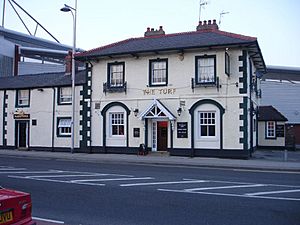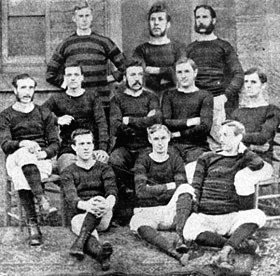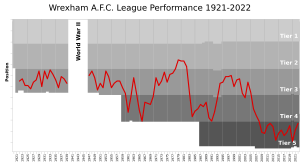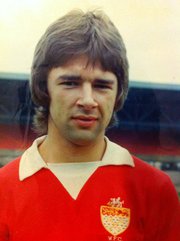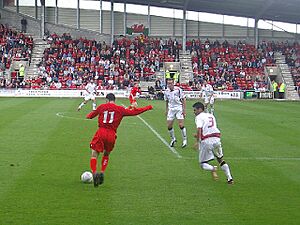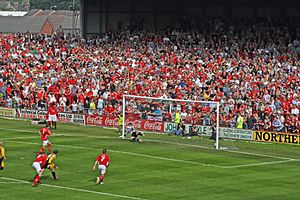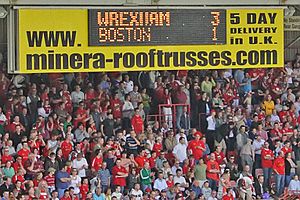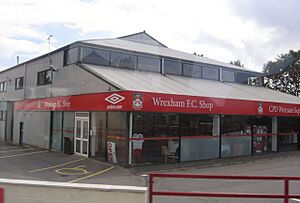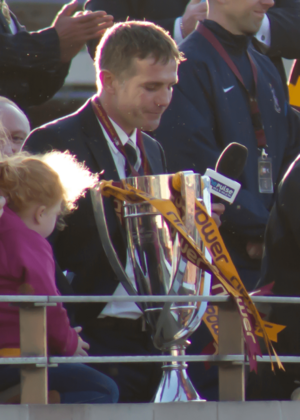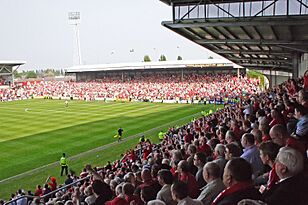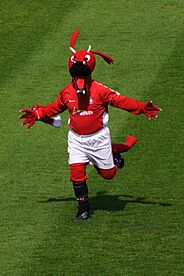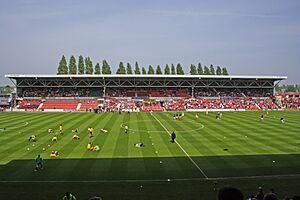Wrexham A.F.C. facts for kids
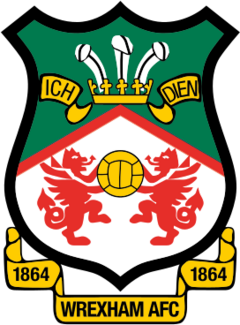 |
|||
| Full name | Wrexham Association Football Club | ||
|---|---|---|---|
| Nickname(s) | The Red Dragons, The Robins, The Town, Y Dreigiau ('the Dragons') | ||
| Short name | Wrexham AFC CPD Wrecsam (Welsh) |
||
| Founded | October 1864 | ||
| Stadium | Racecourse Ground | ||
| Stadium capacity |
10,771 | ||
| Owners |
|
||
| Chairman | Rob McElhenney Ryan Reynolds |
||
| Manager | Phil Parkinson | ||
| League | National League | ||
| 2018–19 | National League, 4th of 24 | ||
|
|
|||
Wrexham Association Football Club (also known as Clwb Pêl-droed Wrecsam in Welsh) is a professional football team from Wrexham, Wales. It was started in 1864, making it the oldest club in Wales. It is also the third-oldest professional football team in the world! The club currently plays in the EFL Championship, which is the second-highest league in English football.
Wrexham has won the Welsh Cup a record 23 times. They also won the FAW Premier Cup five times and the EFL Trophy in 2005. In 2013, they won the FA Trophy. Recently, Wrexham has had amazing success. After many tries, they won the 2022–23 National League title. This earned them a promotion to EFL League Two. They then achieved two more promotions in a row! They finished second in 2023–24 EFL League Two and second in 2024–25 EFL League One. This means they are now in the EFL Championship. Wrexham is the first team ever to get promoted three times in a row in the English Football League!
In the past, Wrexham played in European competitions like the UEFA Cup Winners' Cup. They even reached the quarter-finals in 1976. They beat famous teams like FC Porto and played against strong clubs like Real Zaragoza and Anderlecht. However, Welsh clubs playing in the English system can no longer enter European competitions through the Welsh Cup.
Wrexham got a huge boost when actors Rob McElhenney and Ryan Reynolds bought the club in 2020. This started a new era of success. A TV show called Welcome to Wrexham was made about the club. This show made Wrexham famous all over the world. It helped them gain many new fans, even though they were in the fifth division at the time.
The club's home stadium is the Racecourse Ground. It is the oldest international stadium in the world that still hosts international games. The most people ever to watch a game there was 34,445 in 1957. That was when Wrexham played against Manchester United. Wrexham has big rivalries with English clubs like Chester, Shrewsbury Town, and Tranmere Rovers. These games are called the cross-border derby. Wrexham is also known as a "giant-killer." This means they sometimes beat much stronger teams, like when they famously beat Arsenal in the 1992 FA Cup.
Contents
Club History
Early Days: 1864–1905
Wrexham AFC was started in October 1864. Members of the Wrexham Cricket Club wanted a sport to play in winter. This makes Wrexham one of the oldest football teams ever. Their first game was on October 22, 1864, at the Racecourse Ground. They played against the Prince of Wales Fire Brigade.
In the early days, football rules were still changing. Teams sometimes had up to 17 players! Wrexham helped push for teams to have only 11 players. In 1876, the Football Association of Wales was formed. Wales played its first international match, and Wrexham players Edwin Cross and Alfred Davies were part of the team.
The Welsh Cup competition began in 1877–78. Wrexham reached the first final and beat Druids F.C. 1–0. They won the Welsh Cup again in 1883. In 1883, Wrexham also played in the FA Cup for the first time. They lost to Oswestry. Because of crowd trouble, the club was kicked out of the Football Association. They reformed in 1884 as Wrexham Olympic, later dropping "Olympic" in 1888.
In 1890, Wrexham joined The Combination league. They played there for four years before joining the Welsh Senior League. Wrexham won the Welsh League twice. They then returned to The Combination in 1896.
Joining the Football League: 1905–1968
Wrexham stayed in The Combination league until 1905, winning it four times. In 1905, they joined the Birmingham and District League. Their first game was a 2–1 win against Kidderminster Harriers. During this time, Wrexham won the Welsh Cup six more times.
In 1921, Wrexham was voted into the new Football League Third Division North. Their first League game was at home against Hartlepools United. Wrexham lost 0–2. Later that season, Ted Regan scored the club's first-ever Football League hat-trick. Charlie Hewitt was the club's first manager.
In 1928–29, Wrexham finished third in their division. Tommy Bamford joined the club and scored 201 goals for Wrexham. In 1929–30, Wrexham had their biggest league win, beating Rochdale 8–0. In 1932–33, they finished second in the Third Division North. This was also the first season they wore their famous red and white kit.
During World War II, Wrexham played in a regional league. Many famous guest players, like Stanley Matthews, played for them. After the war, Wrexham again finished third in the Third Division North. In 1956–57, they played Manchester United in the FA Cup. A record 34,445 fans watched the game at the Racecourse.
In 1960, Wrexham was relegated to the new Fourth Division. But under player-manager Ken Barnes, they were promoted back to the Third Division. They also had their biggest league win ever, beating Hartlepool United 10–1. Two years later, they were relegated again. In 1966, they finished last in the Football League.
The Glory Years: 1968–1982
John Neal became manager in 1968. He led Wrexham to promotion to the Third Division in 1970. Welsh clubs could now qualify for the European Cup Winners' Cup by winning the Welsh Cup. Wrexham played their first European match in 1972 against Swiss team FC Zurich. They won and moved to the second round, where they lost to Hajduk Split on away goals.
In 1972–73, the new Yale stand was finished at the stadium. In 1973–74, Wrexham changed their club badge to one with Welsh dragons and feathers, which is still used today. That season, they reached the quarter-finals of the FA Cup. They beat several strong teams before losing to Burnley.
In 1975–76, Wrexham reached the quarter-finals of the European Cup Winners' Cup again. They beat Swedish team Djurgårdens IF and Polish side Stal Rzeszow. They then played Belgian champions Anderlecht and lost narrowly to the team that went on to win the competition.
Arfon Griffiths became player-manager in 1977–78. Wrexham reached the League and FA Cup quarter-finals. They finally won promotion to the second division by beating Rotherham United 7–1. Wrexham also won the Third Division Championship that year. In 1978–79, they reached the fourth round of the FA Cup, losing to a strong Tottenham Hotspur team.
Decline and Non-League Years: 1982–2020
In 1982, Bobby Roberts became manager. The club had money problems and sold many good players. Wrexham was relegated to the Fourth Division again. They almost dropped out of the Football League entirely.
In 1984–85, Wrexham played FC Porto in Europe. They won the home game 1–0 and advanced on away goals after a 4–4 tie. In the next round, they lost to Italian side AS Roma. Their league performance was very bad, and Bobby Roberts was replaced by former player Dixie McNeil.
Dixie McNeil helped the team improve. He led them to a Welsh Cup win in 1986. Wrexham returned to European football, beating Maltese side FC Zurrieq. They then lost to Real Zaragoza on away goals. Safety rules after the Bradford City stadium fire in 1985 led to the closure of a stand at the Racecourse.
In 1989, Wrexham reached the Fourth Division play-offs but lost in the final. Dixie McNeil resigned and Brian Flynn took over. The club continued to struggle. In 1990–91, Wrexham finished last in the Football League. They were also knocked out of the European Cup Winners' Cup by Manchester United.
Giant Killers and Challenges: 1991–2020
The 1991–92 season was tough financially. But Wrexham had a famous FA Cup run. They beat the reigning champions Arsenal 2–1 in a huge upset! Goals from Mickey Thomas and Steve Watkin made it a memorable night. They lost in the next round to West Ham United.
In 1992–93, manager Brian Flynn signed Gary Bennett. Wrexham won promotion to the next tier of English football with a 2–0 win at Northampton Town. In 1994–95, Wrexham had another FA Cup run. They beat Premier League team Ipswich Town 2–1. They then lost to Manchester United at Old Trafford.
In 1995–96, Wrexham played Romanian team Petrolul Ploiești in Europe but were knocked out. In 1996–97, they had another strong FA Cup run. They famously beat West Ham United 1–0 away from home. They reached the quarter-finals before losing to Chesterfield.
In June 1997, Colliers Park, Wrexham's new training ground, opened. It cost £750,000 and is considered one of the best training grounds outside the top league. Even teams like Barcelona have used it! In 1999–2000, Wrexham beat another top-flight team, Middlesbrough, 2–1 in the FA Cup. In May 2001, Wrexham won the FAW Premier Cup.
At the start of the 21st century, the club faced many problems. The chairman, Alex Hamilton, tried to sell the stadium. Fans worked hard to save the club. In December 2004, the club went into financial administration. This meant they lost 10 points, which led to relegation.
Despite money troubles, Wrexham won the 2004–05 Football League Trophy. They beat Southend United 2–0 at the Millennium Stadium in Cardiff. Goals from Juan Ugarte and Darren Ferguson secured the win. The 10-point deduction meant Wrexham was relegated from League One.
In October 2005, a court ruled that Alex Hamilton had wrongly acquired the stadium. In April 2006, local car dealer Neville Dickens took over the club. This saved Wrexham from being kicked out of the League.
The 2006–07 season started well, but manager Denis Smith was sacked. Brian Carey took over. Wrexham avoided relegation on the last day of the season with a 3–1 win over Boston United.
Expectations were high for 2007–08, but Wrexham struggled. Brian Little became manager. Despite new players, Wrexham was relegated to non-League football after 87 years in the Football League.
Wrexham's first season in the Conference Premier (2008–09) ended in 10th place. The next season, they finished 11th. In 2010, the club shared the Racecourse Ground with a rugby league team to help with finances.
In 2011, fans raised £127,000 in one day to help the club. The Wrexham Supporters' Trust (WST) took over running the club. In April 2011, the club faced a large unpaid tax bill. Wrexham finished 4th in 2010–11, but lost in the play-offs.
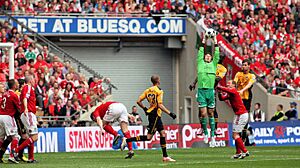
In 2011–12, Wrexham was invited back into the Welsh Cup. Manager Andy Morrell led them to 98 points, but they missed automatic promotion. They lost in the play-offs again. In 2013, Wrexham reached two finals at Wembley Stadium for the first time! They won the FA Trophy on penalties against Grimsby Town. They then lost the play-off final to Newport County. In June 2013, the club's name was officially changed back to Wrexham AFC.
Andy Morrell stepped down in 2014. Wrexham finished 17th in 2013–14. In 2018–19, they finished 4th but lost in the play-offs. In 2019–20, the club finished 19th, their lowest position ever, due to the COVID-19 pandemic.
New Owners, New Era: 2020–Present
In November 2020, American actor Rob McElhenney and Canadian actor Ryan Reynolds bought Wrexham AFC. Fans strongly supported the deal, and it was completed in February 2021. Wrexham was even included in the FIFA 22 video game, the first non-league team to be featured!
The TV show Welcome to Wrexham was released in 2022. It showed the world the club's journey. This made Wrexham incredibly popular globally, bringing in many new fans. Other clubs even started to wonder if they could "do a Wrexham" and get similar attention.
In the 2021–22 season, under manager Phil Parkinson, Wrexham finished second but lost in the play-off semi-final. They also lost the 2022 FA Trophy final.
In the 2022–23 season, Wrexham had an amazing FA Cup run. They beat Coventry City and played a thrilling 3–3 draw against Sheffield United. Wrexham and Notts County battled for the league title all season. Wrexham won the 2022–23 National League title with a record 111 points! This secured their promotion back to the EFL League Two after 15 years.
In the 2023–24 season, Wrexham earned a second promotion in a row, reaching EFL League One. They finished second behind Stockport County. Wrexham also started a new academy program. In April 2024, the backers of Mexican club Club Necaxa bought a small part of Wrexham.
The 2024–25 season began with Wrexham's first League One match in 19 years. They won 3–2 at home. In October 2024, the Allyn family became new investors, increasing the club's value. In March 2025, it was announced that the loans from Reynolds and McElhenney had been fully paid back. Wrexham's income also set a record for a League Two side. On April 26, 2025, Wrexham won promotion to the EFL Championship after beating Charlton Athletic 3–0. They finished second in League One. This made them the first club in English football history to achieve three promotions in a row! The club's value increased greatly in just four years.
Wrexham announced they would visit Australia and New Zealand in July 2025 for pre-season games. They will play against Melbourne Victory, Sydney, and Wellington Phoenix.
Club Badge and Colours
Wrexham's home kit is traditionally a red shirt, white shorts, and white socks. This has been their look since the late 1930s. Away kits have varied, sometimes using white shirts with red shorts and socks. Since 2016, Macron has been the kit supplier. From 2021–22, the number "1934" is sewn onto the back of the neck to remember the Gresford disaster.
For their 150th anniversary in 2014–15, Wrexham wore a red and black striped home shirt, like their very first kit.
For the 2023–24 season, the team's training kit was sponsored by Betty Buzz, a drink company owned by Blake Lively. In July 2025, Ancestry.com became an official club partner. Their logo will be on the training wear for 2025–26.
Kit Suppliers and Shirt Sponsors
| Period | Brand | Shirt Sponsor (chest) | Shirt Sponsor (back) | Shirt Sponsor (sleeve) |
|---|---|---|---|---|
| 1984–85 | Patrick | Crosville Buses | none | none |
| 1985–87 | Winning Ways | Marston's | ||
| 1987–88 | Hi-Tec Sports | |||
| 1988–89 | Admiral Sportswear | |||
| 1989–91 | Spall | |||
| 1991–92 | EN-S | |||
| 1992–98 | Wrexham Lager | |||
| 1998–2002 | Super League | |||
| 2002–04 | Vandanel | Gap Personnel | ||
| 2004–06 | Just Go | |||
| 2006–08 | Lease Direct | |||
| 2008–11 | Umbro | |||
| 2011–12 | Puma | Glyndŵr University | ||
| 2012–14 | Adidas | |||
| 2014–15 | Nike | |||
| 2015–16 | Adidas | |||
| 2016–21 | Macron | Ifor Williams Trailers | ||
| 2021–22 | TikTok | Expedia | Aviation American Gin | |
| 2022–23 | Vistaprint | |||
| 2023–24 | United Airlines | Vistaprint | HP Inc. | |
| 2024–25 | Meta Quest | |||
| 2025–Present |
Players
First-Team Squad
|
|
Players on Loan
|
Hall of Fame
These are some of the important people who have made a big difference to Wrexham A.F.C.
|
|
Player Records
- Most goals in a season: Tommy Bamford – 51 (1933–34)
- Most League goals in a season: Tommy Bamford – 44 (1933–34)
- Most League goals overall: Tommy Bamford – 175
- Most hat tricks: Tommy Bamford – 16
- Most goals in one game by a player: Andy Morrell – 7 (against Merthyr Tydfil, 2000)
- Most League games played: 592 – Arfon Griffiths (1959–61, 1962–79)
- Most games played overall: 713 – Arfon Griffiths (1959–61, 1962–79)
- Most international games played while at Wrexham: 49 – Dennis Lawrence, for Trinidad & Tobago
- Oldest player: Bobby Roberts – 43 years, 88 days (in 1983)
- Youngest player: Ken Roberts – 15 years, 158 days (in 1951)
Coaching Staff
Managerial History
Supporters
Wrexham fans are very dedicated. In 2011, when the club faced being kicked out of the league, fans raised £127,000 in one day to save it! A month later, the Wrexham Supporters' Trust (WST) took over running the club. This means the fans own the club. As of May 2015, over 4,000 adult members jointly owned the club.
Wrexham gets support from its home city and nearby towns in North Wales. For big games, the Racecourse Ground can attract over 11,000 fans. Many Wrexham fans also live in Shropshire, England. There are even fan clubs in places like London and Manchester.
Famous Wrexham fans include Canadian astronaut Chris Hadfield and actors Tim Vincent and Llŷr Ifans. Rugby referee Nigel Owens and former footballers Neil Roberts and Robbie Savage also support the club. Wrexham F.C. Uganda, a club in Uganda, was even created by a Welsh charity.
Team Mascot
Wrex the Dragon is Wrexham's official team mascot. The mascot and the team nickname "The Dragons" were introduced in 2001–02. This helped promote the club's Welsh image. Sometimes, owner Rob McElhenney even dresses up as Wrex!
Rivalries
Wrexham has a strong rivalry with Chester. The two clubs are only 10 miles apart, but Wrexham is Welsh and Chester is English. This is why their games are called the cross-border derby. Wrexham has won more games in this rivalry. These matches are considered "high risk" and often have a large police presence.
Former Chester player Lee Dixon said the Chester versus Wrexham derby was "ferocious." Former Wales and Liverpool star Ian Rush said in 2013 that the cross-border derby is "as intense as they come."
Wrexham also has rivalries with Shrewsbury Town and Tranmere Rovers. These games are also often moved to early kick-offs to prevent trouble. In 2003, 32 hooligans were jailed after a Tranmere vs. Wrexham match.
Recently, Wrexham has developed rivalries with Stockport County and Notts County. Wrexham battled Stockport for the 2021–22 National League title. They then fought Notts County for the 2022–23 title. Wrexham won that title with a thrilling 3–2 victory, helped by a last-minute penalty save from Ben Foster. In 2023–24, Wrexham and Stockport both earned promotion to League One. Wrexham beat Stockport to promotion to the Championship in 2024–25.
Since being promoted to League One, Wrexham has also formed a rivalry with Birmingham City. This is called the "Hollywood Derby." Wrexham is owned by actors Rob McElhenney and Ryan Reynolds. Birmingham City is partly owned by former American football star Tom Brady.
Ownership and Management
Ownership
Wrexham AFC Limited is fully owned by Wrexham Holdings LLC. This company is mostly owned by the R.R. McReynolds Company LLC, which is equally split between Rob McElhenney and Ryan Reynolds. This means they are the main owners of Wrexham AFC.
Smaller parts of Wrexham Holdings LLC are owned by Al Tylis and Sam Porter (5%). Also, "up over 10 percent" is owned by Red Dragon Ventures LLC. This company is owned by R.R. McReynolds Company LLC and Wrexham Scope LLC (which is owned by the Allyn Family). The Allyn Family owns most of Red Dragon Ventures LLC.
Red Dragon Ventures LLC also bought a majority share in the local company Wrexham Lager.
| Person / People | Associated company | Shares | Ref. |
|---|---|---|---|
| Rob McElhenney and Ryan Reynolds | R.R. McReynolds Company LLC | ~ 85% | |
| Allyn Family | Red Dragons Ventures LLC (via Wrexham Scope LLC) | ~ 10% | |
| Al Tylis and Sam Porter | Al Tylis and Sam Porter Investment Group | 5% |
Board of Directors
| Role | Name |
|---|---|
| Chairman | Rob McElhenney & Ryan Reynolds |
| Directors | Kaleen Allyn, Humphrey Ker, Shaun Harvey, Caroline Hutchinson, Thayer Joyce, George Dewey, Ricky Engelberg |
| Chief Executive Officer | Michael Williamson |
| Chief Business and Communications Officer | Rob Faulkner |
| Chief of Staff | Tina Roberts |
| Advisor to the Board | Peter Moore, Les Reed |
Stadium
Since 1864, Wrexham has played its home games at The Racecourse Ground. It is on Mold Road, near Wrexham University and the train station. In 2011, Wrexham University bought the stadium and training facilities. The stadium was then called The Glyndŵr University Racecourse Stadium.
In 2016, the Wrexham Supporters Trust got a 99-year lease on the ground. The name went back to Racecourse Ground. The stadium can hold 10,500 people. In June 2022, Wrexham AFC bought the Racecourse Ground from the university. They plan to make improvements. During the 2024–25 season, the capacity temporarily increased to 13,341 due to a temporary stand.
Training Ground
Wrexham's main training ground used to be Colliers Park in Gresford. It was built in 1997 and cost £750,000. It is known as one of the best training grounds outside the top football league. Even teams like England, Barcelona, and Wales have trained there.
Colliers Park has been improved over time with new pitches. In 2011, Wrexham University bought it. In 2018, the Football Association of Wales invested £4 million to turn it into a National Development Centre.
For a while, Wrexham trained at Stansty Park and then 9 Acre field. However, since the new owners took over, Wrexham sometimes trains at Colliers Park and other places.
International Record
European Record
European Cup Winners' Cup / UEFA Cup Winners' Cup:
| Season | Competition | Round | Opponent | Home | Away | Aggregate | Ref |
|---|---|---|---|---|---|---|---|
| 1972–73 | Cup Winners' Cup | First round | 2–1 | 1–1 | 3–2 | ||
| Second round | 3–1 | 0–2 | 3–3 | ||||
| 1975–76 | Cup Winners' Cup | First round | 2–1 | 1–1 | 3–2 | ||
| Second round | 2–0 | 1–1 | 3–1 | ||||
| Quarter-final | 1–1 | 0–1 | 1–2 | ||||
| 1978–79 | Cup Winners' Cup | First round | 2–0 | 0–3 | 2–3 | ||
| 1979–80 | Cup Winners' Cup | First round | 3–2 | 2–5 | 5–7 | ||
| 1984–85 | Cup Winners' Cup | First round | 1–0 | 3–4 | 4–4 | ||
| Second round | 0–1 | 0–2 | 0–3 | ||||
| 1986–87 | Cup Winners' Cup | First round | 4–0 | 3–0 | 7–0 | ||
| Second round | 2–2 | 0–0 | 2–2 | ||||
| 1990–91 | Cup Winners' Cup | First round | 0–0 | 1–0 | 1–0 | ||
| Second round | 0–2 | 0–3 | 0–5 | ||||
| 1995–96 | Cup Winners' Cup | First round | 0–0 | 0–1 | 0–1 |
International Friendly Games
In 2017, Wrexham had a training camp in Portugal. Over 600 fans traveled to watch them win 2–1 against Louletano. In July 2025, Wrexham will visit Australia and New Zealand for pre-season games. They will play against Melbourne Victory, Sydney, and Wellington Phoenix.
Win Draw Loss Fixtures
| 11 July 2017 Friendly | Louletano D.C. |
1–2 | Loule, Portugal | |
| 18:00 WEST | Mesquita |
Ntumba Massanka Leo Smith |
Stadium: Estadio Municipal de Loule Attendance: 600 |
| 11 July 2025 Friendly | Melbourne Victory |
0–3 | Melbourne, Australia | |
| 19:30 AEST | O'Connor Hardie Evans |
Stadium: Docklands Stadium Attendance: 37,020 |
| 15 July 2025 Friendly | Sydney |
2–1 | Sydney, Australia | |
| 19:30 AEST | Popovic Lacey |
Hollman |
Stadium: Sydney Football Stadium Attendance: 40,242 |
| 19 July 2025 Friendly | Wellington Phoenix |
v | Wellington, New Zealand | |
| 17:00 NZST | Stadium: Wellington Regional Stadium |
Honours and Achievements
Wrexham AFC has won many trophies and achieved great things:
| Type | Competition | Titles | Seasons |
|---|---|---|---|
| League | Third Division North / Third Division / League One (Level 3) | 1 | 1977–78
Runners-up: 1932–33, 2024–25 |
| Fourth Division / Third Division / League Two (Level 4) | 0 | Runners-up: 1969–70, 1992–93, 2023–24
Promoted: 1961–62, 2002–03 |
|
| National League (Level 5) | 1 | 2022–23
Runners-up: 2011–12, 2021–22 |
|
| The Combination | 4 | 1900–01, 1901–02, 1902–03, 1904–05 | |
| Welsh Senior League | 2 | 1894–95, 1895–96 | |
| Cup | Football League Trophy | 1 | 2004–05 |
| FA Trophy | 1 | 2012–13
Runners-up: 2014–15, 2021–22 |
|
| Football League North Cup | 1 | 1943–44 | |
| Supporters Direct Cup | 1 | 2015–16 (shared) | |
| Welsh Cup | 23 | 1877–78, 1882–83, 1892–93, 1896–97, 1902–03, 1904–05, 1908–09, 1909–10, 1910–11, 1913–14, 1914–15, 1920–21, 1923–24, 1924–25, 1930–31, 1956–57, 1957–58, 1959–60, 1971–72, 1974–75, 1977–78, 1985–86, 1994–95 | |
| FAW Premier Cup | 5 | 1997–98, 1999–2000, 2000–01, 2002–03, 2003–04 |
- record
Club Records
- Highest attendance: 34,445 vs Manchester United, FA Cup 4th round, January 26, 1957
- Highest League attendance: 29,261 vs Chester City, Division Three, December 26, 1936
- Average attendance: 12,781, 2024–25 season
- Biggest league win: 10–1 vs Hartlepools United, March 3, 1962
- Worst league defeat: 9–0 vs Brentford, Division Three, October 15, 1963
- Highest league finish: 15th, Second Division, 1978–79
- Lowest league finish: 17th, Conference National, 2013–14
- Biggest cup win: 6–0 vs Charlton Athletic, FA Cup 3rd round, January 5, 1980
- Most games won in a row: 10, April 5 – May 8, 2003
- Most league wins in a season: 34, 2022–23
- Most goals in a season: 115, 2022–23
- Longest unbeaten run: 28 games, October 2022 – April 7, 2023
- Most consecutive league clean sheets: 7, October 9 – November 26, 2011
- Most clean sheets in a season: 26, 1973–74 and 2018–19
- Highest transfer fee received: £800,000 for Bryan Hughes, to Birmingham City, 1997
- Highest transfer fee paid: £2,000,000 for Sam Smith, from Reading, 2025
Books About Wrexham
- Champions 2022/23 – The Story Of A Record-Breaking Season, Wrexham A.F.C., 2023
- The Giant Killers; a Wrexham fan's view by Richard Partington, Bridge Books, 2001
- My Wrexham Story; The Inspirational Autobiography From The Beloved Football Hero by Paul Mullin, Cornerstone, 2023
- Tinseltown: Hollywood and the Beautiful Game – A Match Made In Wrexham by Ian Herbert, Headline, 2023
- Wrexham AFC (Ultimate Football Heroes) by Paul Harrison, John Blake Publishing, 2024
- Wrexham; The European era by Peter Jones, Desert Island Books, 2002
- Wrexham; Through The Trap Door by Peter Jones, Desert Island Books, 2008
The team is also important in the 1994 book Twenty Two Foreigners in Funny Shorts by Peter Davies.
See also
 In Spanish: Wrexham Association Football Club para niños
In Spanish: Wrexham Association Football Club para niños
- Club of Pioneers
- List of Wrexham A.F.C. seasons
- List of Wrexham A.F.C. records and statistics
- Welcome to Wrexham


